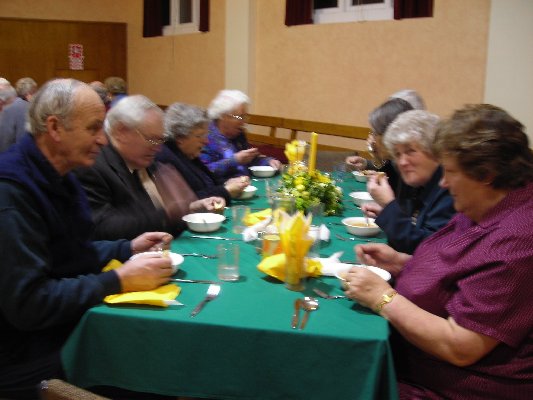|

One
table at the introductory dinner for the Rev Andrew Bell, director
of the Global Mission Office of the Presbyterian Church, on his
first visit to Invercargill.
Front left, Bill Blaikie and Bruce Hoffman. Front right Bev Blaikie
and Chris Williamson
Parish
Register
Deaths
Helen
Cowie, died 25 July 2007. Funeral service in First Church on 28
July 2007 conducted by Rev Richard Gray.
Kathleen
McLew, died 2 September 2007. Funeral service at First Church on
5 September 2007 conducted by Rev Richard Gray.
Thomas
(Tom) McDowall, died 6 September 2007. Funeral Service at First
Church on 11 September 2007, conducted by the Rev Alistair Taylor.
Tom, a master bricklayer, did much of the restoration work on the
First Church building and in his youth sang in the church choir.
We
extend sincere sympathy to the families concerned.
Dates
to Note
October
6 Concert "From Baroque to Contemporary" in First Church
at 7.30pm
October 9 Closure of voting on LOM proposal
October 14 First Church Annual Meeting after service and Tay Music
Trust Concert at 2.30pm
October 27 Garage Sale in Stobo Hall.
November 1 All Saints Day Service 7.00pm
Morning
Tea Roster
October
7 Torri Ross, Valda Peattie, Margaret Price
October 14 Val Adams, Alan & Yvonne Smith
October 21 Betty Ellis, Wilma & Peter Muller
October 28 Valda Peattie, Barbara Clark, Frances Tait
November 4 Cheryl McMath, Shirley & George Shields
November 11 Hugh & Heather Joyce, Marion Pinkney
November 18 Donita Crombie, Moya Twaddle, Sami Steele
November 25 Anne Kuijpers, Joan Poole, Janice Brown
If
you find the date you have been rostered on unsuitable,
please find a replacement. Would the first person named
on the day please bring milk.
Still looking for volunteers to take a turn making morning
tea. Please don't be shy, I would love to hear from you.
Thank you. Valda Peattie 216-0970
What
Simon and Marion Rae are up to
Building
Bridges in a World of Diversity', is a programme statement of the
Centre for Religious and Cross-cultural Studies (CRCS), in the Graduate
School of Gadjah Mada University (UGM), Yogyakarta, in Central Java,
Indonesia.
Rev Dr Simon Rae
Marion and Simon Rae have been invited to accept a six-month secondment
to the Centre as part of the New Zealand Government's active support
of inter-faith dialogue in our region. If all goes to plan Simon
will go up for six weeks from late October and they will both go
for semester 2, 2008, after Simon has presented his semester 1 Otago
course on Intercultural Theology.
The
Raes began their language study in Yogyakarta, 'the cradle of Javanese
civilization', in 1972, but expect to see a city much changed -
not least by the recent devastating earthquake. Gadjah Mada, named
for a famous chief minister of the Majapahit Empire that once spanned
much of Southeast Asia, is one of the region's finest universities,
with 55,000 students drawn from Indonesia and abroad. Its strengths
are in medicine (which draws many overseas students), humanities
and the social sciences, science and technology. In 2005 it was
ranked as one of the world's leading universities in medicine, social
sciences and humanities
CRCS
offers an MA programme for a wide constituency, for Indonesian and
overseas students, women and men of all the major faiths. After
five years its graduates are now engaged in religious education
(Muslim, Christian, Buddhist, Hindu) at secondary and tertiary levels,
Christian ministry, University teaching, social activism (HIV/Aids,
sexuality issues, women's participation in religion and society,
fundamentalisms) and some are continuing their study at doctoral
level overseas..
Since
'retirement' Simon has worked with Indonesian Muslim and Christian
doctoral students in two Dutch universities, tutoring (and in one
case examining) on the internet. It should be possible to work in
this way also with CRCS between his visits and after returning to
New Zealand. In addition to
working
with students Simon has been asked to assist with curriculum and
library development and to engage in some relevant research project.
Marion, who is a specialist ESOL teacher, should have good scope
for assisting students who hope to present in English or to continue
their study overseas.
Accommodation
will be provided to facilitate social engagement with colleagues,
students and friends from the city. Our government sees all of this
as part of an effort to enhance peace and security in the context
of the very diverse religious communities found in our region. CRCS
operates in a secular environment (it answers to the university,
not to any religious community) and offers programmes that provide
concrete experiences of working at problems in an inter-faith environment.
The programme will in time produce a growing number of religious
academics and teachers, leaders of religious congregations, and
social activists (and no doubt in time some politicians) who will
in their turn shape, or re-shape, community attitudes to religious
and related differences.
Indonesians
today are working hard to develop a more democratic society. This
has led CRCS to extend its programmes beyond the lecture room, into
public education activities to disseminate ideas about alternative
and better social structures. The Alliance of Civilisations 2006
Report identified several fields for action, including:
" Ensuring that education gives people an accurate picture
of other peoples and cultures;
" Giving youth more opportunities to understand people from
other countries and societies;
" Encouraging the media to avoid stereotyping and the overstating
of conflict and disagreement.
As a profoundly religious people who have chosen a secularly-religious
social order, Indonesians are very aware of the religious dimensions
of both the problems and the opportunities of the era. In this context
CRCS has a well-defined role to play, and New Zealanders should
welcome our own government's unprecedented support for efforts to
develop a respectful and realistic relationship between the often
politicised religious communities of South-east Asia.
|